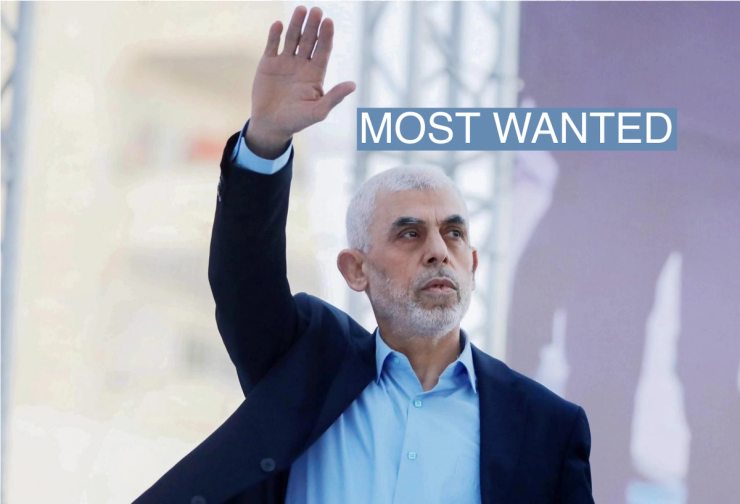The News
Three Hamas leaders have emerged at the top of Israel’s most wanted list for their suspected roles in overseeing Saturday’s massacre of at least 1,000 Israelis and their central roles in coordinating military and terrorist operations with Iran, according to current and former Israeli officials.
In this article:
Know More
The Israel Defense Forces placed a bounty on Hamas’s top political leader in the Gaza Strip, Yahya Sinwar, earlier this week and pledged to kill him as part of the broader campaign to dismantle Hamas.
“Yahya Sinwar is the commander of the campaign, and he is a dead man,” an IDF spokesman, Rear Admiral Daniel Hagari, told reporters on Monday. “[Hamas’s] military and political leadership, all of its assets, are attackable, and doomed.”
Current and former Israeli officials told Semafor they’re also focused on Hamas’s top operative in Lebanon, Saleh al-Arouri. The long-standing Hamas leader, these officials said, is the point man in coordinating with commanders from Iran’s Islamic Revolutionary Guard Corp, or IRGC, and the Lebanese militia Hezbollah.
Israeli officials and Arab media have tracked meetings in Beirut between Arouri and IRGC and Hezbollah officials before Hamas’s Saturday assault on southern Israel. They said they’re still assessing whether Iran and Hezbollah were directly involved in planning the attacks. And they said they’re concerned Arouri could be planning to open a northern front against Israel through his collaboration with the IRGC and Hezbollah.
The third on the Israeli hit list is Mohammed Deif, the one-eyed commander who oversees Hamas’s military wing, the Al-Qassam Brigades. Deif is believed to be the operational planner of the Saturday attack, which included the infiltration of 1,000 Hamas fighters over Israel’s southern border.
Jay’s view
Targeting Hamas’s leaders will be challenging for Israel, both because of their disparate locations and their secretive maneuverings. Many of the Palestinian movement’s top brass are in Qatar, under the protection of the Gulf emirate’s security forces. Others are based in Turkey, Lebanon, and the West Bank. Sinwar and Deif both have survived multiple assassination attempts conducted by the Israeli military and intelligence services over the past three decades.
The Israelis, ironically, know both Sinwar and Arouri well. Both spent years in Israeli prisons and were debriefed regularly during their incarcerations by both security officials and journalists. The Israeli commentator and analyst Ehud Yaari recounted this week interviewing Sinwar multiple times and discussing his hopes to essentially merge Hamas’s military operations into those of Iran’s and Hezbollah in order to create a united front against Israel.
“Sinwar didn’t want to fight Israel on his own,” Yaari said Tuesday at an event hosted by the Washington Institute for Near East Policy. “In case the knife is on your throat, in case the Israeli army invades Gaza forcefully, there will be an activation, the ignition, of a Lebanese front and, to a lesser extent, Syrian front.” Sinwar was released by Israel in 2011, after serving 22 years in prison, as part of a prisoner exchange for the Israeli soldier, Gilad Shalit.
Hamas was created in the late 1980s as an offshoot of the Muslim Brotherhood, a pan-Islamist movement that seeks to rule through Islamic law. Hamas, as a Sunni Islamic organization, has its roots in the Brotherhood’s Egyptian founders and initially drew its support from Arab countries in the Levant and the Persian Gulf. But as many of these states normalized relations with Israel over the past three decades, Hamas’s leaders turned toward revolutionary Iran, a Shiite Muslim state, for funding and money.
Israeli officials cite both Sinwar and Arouri as critical players in aligning Hamas with the IRGC and Hezbollah. There were tensions in relations between these sides in the early 2010s, when Iran’s ally in Syria, President Bashar al Assad, launched a war against his country’s Muslim Brotherhood organizations. But Sinwar and Arouri were central in healing this rift.
“They’re too close to the Iranians,” Neomi Neumann, the former head of research of the Israel internal security forces, or Shin Bet, said of Sinwar and Arouri on Tuesday. “Saleh al-Arouri is sitting in Lebanon meetings on a regular basis [with] Hezbollah and people from Iran. They’re meeting, they’re coordinating, they’re getting money and new knowledge.”
Israeli officials feel particularly duped by Sinwar. In recent years, he’d talked of prioritizing economic development in the Gaza Strip over the struggle against Israel. That’s now seen as a ruse and that contributed to Israel’s lax defenses on its southern border.
Room for Disagreement
A number of the U.S.’s military partners and allies in the Middle East are already opposing Israel’s military campaign in Gaza and the targeting of Hamas’s leaders. Turkey’s President Recep Tayyip Erdogan on Wednesday warned that the IDF is preparing to “massacre” Palestinians in the Gaza Strip. “Preventing people meeting their most fundamental needs and bombing housing…where civilians live - in short, conducting a conflict using every sort of shameful method - is not a war, it’s a massacre,” he said in Ankara.
Qatar is also protecting many of Hamas’s leaders and has started mediations to guarantee the release of Israeli women and children currently being held in the Gaza Strip. Part of these negotiations could include the free passage of Hamas’s leaders there.
Notable
- In 2019, Yahya Sinwar gave a speech praising Iran for building Hamas’s missile capabilities.
- Last month, Saleh al-Arouri met with Hezbollah leader Hassan Nasrallah in Lebanon.


